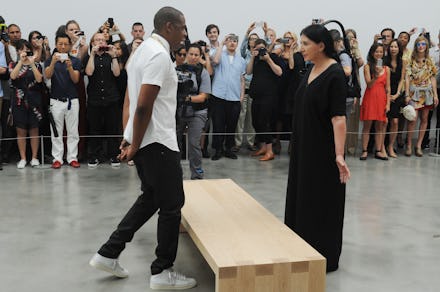Microsoft pulled an ad featuring Marina Abramović after internet trolls called her a satanist

This week Microsoft pulled an ad featuring Marina Abramović after a resurgence of conspiracy theories about the artist emerged involving satanism, Wikileaks, and Hillary Clinton’s former campaign chairman, John Podesta. The pressure on Microsoft mounted on Monday after InfoWars, a site run by noted conspiracy theorist and bogus vitamin supplement peddler Alex Jones, wrote about the ad, asking, “Would a tech company really want a Luciferian individual like her to be the face of their new “mixed reality” device because of her “art”?” The ad, which was for the mixed reality headset Hololens 2, was bombarded with over 20,000 dislikes, and Reddit threads devoted to the controversy began to pop up.
The ad featured Abramović talking about her first mixed reality work, called The Life, which is presented on the Hololens 2, and her hope for the technology’s future. “I believe that art of the future is art without objects,” she said. “This is just purely transmission of energy between the viewer and the artist. To me, mixed reality is this answer.” The video also featured interviews with the work’s director, Todd Eckert, and Alex Marshall, the vice president of Christie’s, which is planning to auction the work in October.
To understand where the allegations of satanism fit in, you’ve got to go way back to the worry-free days when Hillary Clinton was running for president and John Podesta was her campaign chairman. In 2014, Podesta’s brother, Todd, a well known art collector, was invited to Abramović's home for a “Spirit Cooking dinner” for donors of her Kickstarter campaign. In an email to Todd, Abramović asked if his brother would like to join them. “It was just a normal dinner,” Abramovic told ARTnews in 2016. “It was actually just a normal menu, which I call spirit cooking. There was no blood, no anything else. We just call things funny names, that’s all.” While John didn’t attend the dinner, in 2016 a cache of his hacked emails was published by Wikileaks. Among them was the email from Abramović, which had been forwarded to John by his brother.
From there, the corner of the internet that subscribes to theories like Pizzagate (which also originated from Podesta’s stolen emails), went wild, largely clinging to the idea that the dinner was a satanic ritual based on an old performance of Abramović’s in which she paints on walls phrases like "FRESH MORNiNG URiNE SPRiNKLE OVER NIGHTMARE DREAMS" and "SPiRiT COOKiNG," using pig’s blood.
The performance behind the ad, and by extension the ad itself, are worthwhile, breaking ground in both art and technology. The piece is expected to fetch in the ballpark of $775,000 in October as the first mixed reality artwork ever auctioned, and, as the ad pointed out, its use of Microsoft’s technology created an entirely new way to preserve a notoriously ephemeral form of art. “There is always this great idea of immortality,” Abramović says as she dons the headset and watches her own performance. “Once you die the work will never die because the work of art can continue. In performance [art] the piece is only in the memory of the audience and nowhere else. Here I am kept forever.”
Most companies would kill for this sort of collaboration with and endorsement from one of this generation’s most well-known artists. And, until this week, the whole satanic ritual thing had been largely forgotten, and was considered by most non-lizard-brain inclined people to be a funny side story about a wild time in American history. Which is why it’s disappointing that Microsoft, whose own co-founder Bill Gates is himself currently named in a bizarre conspiracy theory involving coronavirus and 5G technology that has resulted in the burning of cell towers, would pull the ad seemingly based on this sort of backlash. (Microsoft did not respond to a request for comment.)
This is just the latest in a long history of companies who appear unsure of how to handle internet controversy rooted in our hyper-partisan moment. During a time when tech platforms are pledging more than ever to fight misinformation and fake news, it’s especially disheartening to see one of the largest among them capitulate to an unhinged army of internet trolls.
Mic has reached out to Christie’s, whose plans to offer the work are presumably unchanged, as well as Abramović, and will update this post if we receive a response.